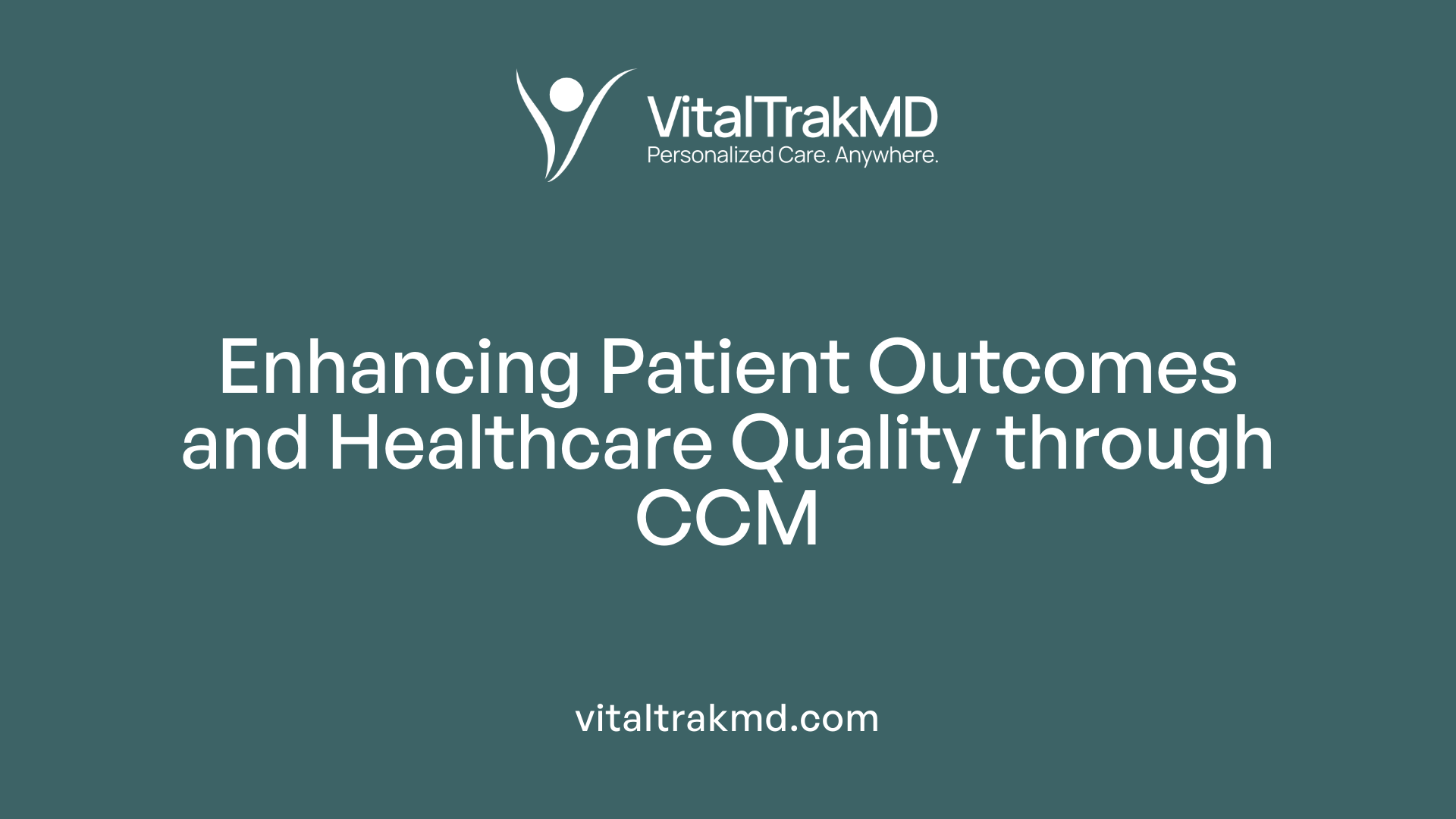The Science Behind Chronic Care Management

Unveiling the Foundations of Chronic Care Management
Chronic Care Management (CCM) is a transformative approach rooted in scientific principles, designed to improve outcomes for individuals with long-term health conditions. Developed and refined over decades by leading healthcare researchers and practitioners, CCM integrates evidence-based frameworks, technological innovation, and patient-centered strategies. This article explores the scientific underpinnings, operational models, and clinical evidence supporting CCM, offering insights into how structured care, interdisciplinary collaboration, and personalized approaches are revolutionizing chronic disease management.
Historical Development and Foundations of the Chronic Care Model

How was the Chronic Care Model (CCM) developed and revised over time?
The origins of the CCM trace back to 1996 when it was initially designed as a framework to improve the delivery of care for patients with chronic illnesses. Developed by Edward Wagner and colleagues at the MacColl Center for Healthcare Innovation, the model aimed to address the complexities of managing long-term conditions dynamically and proactively.
In 1998, Wagner formally introduced the model, emphasizing the importance of organized, evidence-based, and patient-centered care strategies. The initial framework laid the groundwork for transforming typical reactive healthcare practices into more structured, population-based approaches.
Further refinements came in 2003 when the Improving Chronic Illness Care (ICIC) program advanced the CCM, incorporating insights from extensive research and practical implementations. This evolution focused on integrating the latest evidence-based practices, digital health tools, and team-based care components to enhance outcomes.
The model's continuous development over the years has been characterized by adapting to emerging healthcare needs, technological advances, and a deeper understanding of patient engagement, ultimately shaping the modern proactive, holistic approach to chronic disease care.
Who was responsible for the development of the CCM?
Edward Wagner, MD, MPH, was the principal architect of the CCM. His work at the MacColl Center for Healthcare Innovation was pivotal in conceptualizing and promoting a systematic approach that combines patient self-management, organized care delivery, and supportive health system infrastructure.
Wagner’s leadership in integrating scientific research into practical healthcare frameworks has significantly influenced international practices for managing chronic illnesses.
How does the CCM incorporate scientific evidence into its practices?
The CCM emphasizes the integration of evidence-based practices by promoting interventions that have demonstrated effectiveness across multiple clinical settings. This includes self-management education, decision support systems, and the use of clinical information technology.
For example, numerous studies have shown that restructuring care according to the CCM components leads to improved clinical outcomes such as better glycemic control in diabetes or reduced hospitalizations for heart failure.
The model encourages continuous quality improvement, leveraging clinical data and patient feedback to refine care processes and ensure they are aligned with the latest scientific insights.
How has the CCM influenced healthcare practices worldwide?
The CCM has been adopted globally, guiding numerous health organizations to shift from reactive, disease-centered care to proactive, integrated management programs. Its emphasis on team-based, patient-centered care and system reforms has fostered widespread improvements in quality and efficiency.
Most implementations focus on the six core components—self-management support, delivery system design, decision support, clinical information systems, healthcare organization, and community resources—and have shown positive impacts on patient outcomes over nearly two decades.
Research continues to support its effectiveness, motivating healthcare policymakers and providers worldwide to adopt and adapt the CCM to diverse healthcare contexts.
How is the framework relevant today?
Today, the CCM’s principles underpin many modern initiatives, including telehealth, remote patient monitoring, and integrated digital health tools. These innovations enhance structured, continuous care, especially crucial during disruptive events like the COVID-19 pandemic.
The model’s emphasis on personalized, goal-oriented, and community-engaged care remains central to evolving healthcare delivery, aiming to improve health outcomes, reduce costs, and enhance patient satisfaction through sustainable and adaptable care systems.
| Year | Development Stage | Contributions | Notable Outcomes |
|---|---|---|---|
| 1996 | Original design | Conceptual framework for organized, proactive care | Basis for future refinements |
| 1998 | Formal introduction of CCM | Emphasized structured, evidence-based, patient-centered care | Increased focus on chronic illness management |
| 2003 | Refinements via ICIC | Integration of practical tools and community engagement | Broader implementation and effectiveness |
The sustained evolution of the CCM demonstrates a solid scientific foundation, driven by research, clinical outcomes, and healthcare innovation, affirming its pivotal role in chronic disease management worldwide.
Core Components and Operational Mechanisms of the CCM
What are the key components of the Chronic Care Model?
The Chronic Care Model (CCM) is built around six main components that work together to promote high-quality, proactive care for individuals with chronic diseases. These six elements include community resources, health system organization, self-management support, delivery system design, decision support, and clinical information systems.
Community resources involve leveraging local services, programs, and partnerships to support patient health outside of clinical settings. These resources can include social services, nutritional assistance, and physical activity programs.
Health system organization emphasizes leadership commitment and a culture that prioritizes continuous quality improvement and patient-centered care. It involves creating a healthcare environment that encourages proactive management rather than reactive treatment.
Self-management support empowers patients by providing education, coaching, and tools to take an active role in managing their conditions. This component focuses on goal setting, problem-solving, and motivational strategies.
Delivery system design ensures that care delivery is organized, team-based, and well-coordinated. Regular, planned interactions with patients and clear team roles are central, along with care management for patients with complex needs.
Decision support offers clinicians access to evidence-based guidelines, decision aids, and tools to enhance clinical judgment and optimize treatment plans.
Clinical information systems involve organized data collection through electronic health records, patient registries, and other IT tools. These systems support real-time monitoring, reminders, and personalized care planning.
Each component plays a vital role in establishing a proactive, organized, and patient-centered approach to chronic disease management. The integration of these elements allows healthcare teams to deliver seamless, coordinated care that adapts to individual patient needs.
How does each component support proactive, organized care?
Community resources extend care beyond clinical walls, offering supportive environments for lifestyle management and social determinant addressing. Health system organization creates leadership and accountability structures, fostering a culture that values continuous improvement and quality outcomes. Self-management support equips patients with the skills and confidence needed to monitor and control their health, reducing dependency on acute care services. Delivery system design structures interactions, ensuring patients have scheduled, consistent follow-ups and team-based intervention plans. Decision support ensures clinicians utilize the latest evidence, avoiding unnecessary treatments and focusing on personalized interventions. Clinical information systems enable data-driven decision making, tracking patient progress, flagging issues early, and facilitating communication among care team members. By intertwining these components, the CCM transforms chronic care from reactive to proactive, emphasizing prevention, early intervention, and patient engagement.
The role of health information technology and community resources
Technology forms the backbone of clinical information systems within CCM. Electronic health records (EHRs), patient registries, and telehealth platforms enable timely data sharing, care coordination, and remote monitoring. EHRs keep comprehensive, up-to-date patient information accessible across providers, which is vital for continuity and safety. Patient registries help identify populations at risk, facilitate outreach, and monitor outcomes over time. Remote patient monitoring (RPM) devices collect vital sign data, alert providers to worsening conditions, and support timely interventions.
Community resources complement technological tools by providing essential social support, lifestyle programs, and environmental interventions that influence health behaviors. Partnerships between healthcare providers and community organizations foster a holistic approach, addressing social determinants of health that play a significant role in chronic disease outcomes. Integrating these technological and community-based resources into the CCM framework enhances its capacity to deliver comprehensive, patient-centered care, improving both quality and efficiency of healthcare services.
The Impact of CCM on Patient Outcomes and Healthcare Quality

How does the Chronic Care Model improve patient health outcomes?
The Chronic Care Model (CCM) enhances patient health by providing a structured framework that promotes proactive, coordinated care tailored to individual needs. It incorporates essential components such as self-management support, clinical information systems, decision support, community resources, healthcare organization, and delivery system redesign. This comprehensive approach encourages a shift from reactive, episodic care to ongoing, planned management, fostering consistent engagement between patients and healthcare teams. Evidence shows that CCM implementation improves various process measures, including medication adherence, screening rates, and patient education, which directly influence health outcomes. Patients under CCM tend to experience better disease control, demonstrated by reduced HbA1c levels in diabetes, normalized blood pressure, and improved lipid profiles like LDL cholesterol. Furthermore, CCM-driven care has been linked to fewer hospital admissions and readmissions, shorter hospital stays, and overall lower healthcare costs. By emphasizing goal-setting aligned with patient preferences, the model promotes lifestyle modifications and active participation, leading to more effective management of chronic illnesses and better quality of life. Ultimately, CCM fosters a personalized, patient-centered approach that results in more favorable health trajectories.
What clinical outcomes are supported by research evidence in CCM?
Research consistently supports the positive impact of CCM on clinical outcomes for individuals with chronic diseases. Studies have demonstrated significant improvements in glycemic control among diabetic patients, with reductions in HbA1c levels indicating better blood sugar management. In addition, CCM has been shown to reduce hospitalizations and emergency department visits for conditions like congestive heart failure, asthma, COPD, and hypertension. For example, remote patient monitoring within CCM programs has contributed to an 83% reduction in hospital readmissions for some patient populations. Quality of life enhancements include increased patient knowledge, better adherence to treatment regimens, and heightened satisfaction with care. These interventions also lead to measurable clinical improvements, including controlled blood pressure and stabilized respiratory status. Economic evaluations highlight that CCM reduces overall healthcare costs by decreasing unnecessary hospital stays, emergency visits, and associated treatments. This combination of clinical effectiveness and cost savings underscores the value of adopting CCM approaches across diverse healthcare settings.
| Outcome Area | Evidence of Improvement | Supporting Details |
|---|---|---|
| Disease control (HbA1c, BP) | Significant improvements | Reduced HbA1c, normalized BP readings |
| Hospitalizations | Marked reductions | Up to 83% decrease in readmission rates for some conditions |
| Emergency visits | Decreased frequency | 44.3% reduction in ER visits for COPD |
| Patient engagement and self-management | Enhanced participation | Better adherence, increased disease understanding |
| Healthcare costs | Cost reductions | Fewer hospital stays, lower emergency care costs |
This extensive body of research confirms that the CCM not only improves clinical markers but also enhances patient engagement, reduces healthcare utilization, and offers economic benefits—making it a vital component of modern chronic illness management.
The Scientific Principles and Data Supporting CCM Practices

What is the scientific rationale behind chronic care management practices?
The scientific foundation of chronic care management (CCM) is rooted in a comprehensive approach that emphasizes proactive, organized, and patient-centered care. This approach is grounded in the understanding that managing multiple, long-term conditions requires more than just treating episodic health issues; it involves continuous coordination of medical, psychosocial, and functional needs.
A central framework guiding CCM is the Chronic Care Model (CCM), which advocates for organized teams, self-management support, decision support, clinical information systems, community resources, and organization of healthcare. These elements work together to create a system designed to reduce hospitalizations, improve health outcomes, and enhance quality of life.
Technological tools like electronic health records (EHRs), remote patient monitoring (RPM), and personalized care plans allow healthcare providers to tailor interventions precisely to individual needs. This precision supports the timely management of symptoms and prevents disease exacerbations.
Research consistently demonstrates that this multidisciplinary, proactive approach leads to significant health benefits. For example, studies have shown that structured CCM programs reduce hospital readmissions and emergency visits while improving control over chronic diseases such as diabetes, hypertension, and COPD.
Furthermore, goal-oriented care, which aligns treatment plans with personal priorities, enhances patient adherence and satisfaction. Overall, the practice is scientifically supported by evidence indicating that well-organized, patient-centered, and data-driven care strategies lead to better health outcomes and cost savings.
How does research inform best practices in CCM?
Research plays a vital role in shaping and refining CCM practices by providing empirical evidence on the effectiveness of specific interventions and organizational elements. Large-scale studies have confirmed that components such as remote patient monitoring, team-based care, and patient education significantly improve clinical parameters like blood sugar and blood pressure.
Studies also reveal that integrating evidence-based guidelines into decision support systems reduces variability in care, ensuring treatments align with current scientific standards. This systematic application of science minimizes unnecessary interventions and maximizes effective ones.
Data from ongoing research continues to evolve in areas such as goal-oriented care and technology use. For instance, research indicates that personalized care plans that focus on individual goals improve patient engagement and adherence.
Cost-effectiveness analyses show that CCM reduces hospital admissions and emergency department visits, leading to healthcare savings. These findings reinforce the importance of continual evaluation and adaptation based on emerging scientific data.
Through rigorous research, best practices are continually identified, validated, and implemented, ensuring CCM remains a science-driven, effective approach to managing chronic diseases.
The Future of Chronic Care Management Innovation and Personalization

Emerging Trends, AI, Telehealth, and Personalized Medicine
The landscape of chronic care management (CCM) is rapidly evolving, driven by technological advances and a shift towards more personalized approaches. Artificial Intelligence (AI) plays a pivotal role by analyzing vast amounts of health data to predict patient risks, tailor interventions, and optimize resource allocation. AI-powered tools facilitate more accurate diagnoses, monitor disease progression, and support decision-making processes.
Telehealth has become an indispensable component of CCM, especially highlighted during the COVID-19 pandemic. Through virtual visits, remote patient monitoring (RPM), and digital communication platforms, healthcare providers can maintain continuous engagement with patients regardless of location. These innovations enable timely interventions, enhance self-management, and reduce hospital admissions.
Personalized medicine further enhances CCM by considering individual genetic profiles, lifestyle factors, and social determinants of health. This approach allows for customized treatment plans that align with each patient’s unique needs and goals, increasing the likelihood of adherence and positive outcomes.
Advances in Goal-Oriented and Patient-Centered Care
Modern CCM emphasizes goal-oriented, patient-centered care, shifting focus from solely disease management to supporting what matters most to each individual. This model involves understanding personal health goals, life context, and preferences, which inform treatment decisions.
Healthcare providers are adopting strategies that foster shared decision-making, where patient and clinician collaboratively set achievable, meaningful health goals. This approach enhances motivation, engagement, and satisfaction, leading to better health behaviors and disease control.
Incorporating psychosocial factors, cultural competence, and social support mechanisms into care plans ensures that interventions are holistic and respectful of patient diversity. Technology tools like patient portals and health apps empower individuals to actively participate in their care.
Policy and Technology Developments Supporting Future Growth
Policy initiatives are increasingly backing innovations in CCM. Reimbursements for remote care services, expanded coverage for telehealth, and support for integrated care models are creating an environment conducive to growth. The CHRONIC Care Act and other legislative efforts recognize the value of comprehensive, technology-enabled management programs.
On the technological front, advancements in Electronic Health Records (EHRs), interoperability, and data sharing facilitate coordinated care across multiple providers and settings. Predictive analytics and machine learning algorithms help identify at-risk populations and tailor interventions proactively.
Wearable devices and biosensors provide real-time health monitoring, enabling early detection of clinical deterioration. Mobile health applications foster ongoing self-management, medication adherence, and direct communication with care teams.
Furthermore, developing secure, user-friendly digital platforms enhances access, especially for underserved and rural populations, reducing disparities in chronic care.
Table Summarizing Innovation Drivers in CCM
| Innovation Area | Examples | Impact Goals | Supporting Policies |
|---|---|---|---|
| Artificial Intelligence | Risk prediction, decision support systems | Personalized insights, efficient resource use | Reimbursement for AI-driven tools |
| Telehealth & RPM | Virtual visits, remote vital sign tracking | Increased access, early intervention | Expanded telehealth coverage policies |
| Personalization | Genetic testing, social determinants integration | Tailored treatments and goals | Policy incentives for personalized care models |
| Data Integration | EHR interoperability, analytics platforms | Better coordination, data-driven decisions | Legislation supporting data sharing |
| Wearables & Mobile Apps | Fitness trackers, medication reminders | Self-management, behavior change | Reimbursement for digital health tools |
Looking Ahead: The Path Forward
The future of CCM lies in integrating these technological and policy advancements with a deepening commitment to personalized, goal-oriented care. By leveraging AI, telehealth, and patient engagement strategies, healthcare systems can better address the complexities of chronic illnesses.
Innovative models will continue to evolve toward more holistic, inclusive, and technologically integrated frameworks that center on individual needs and life context. This evolution promises not only to improve health outcomes but also to enhance patient satisfaction, reduce healthcare costs, and transform chronic disease management into a proactive, preventive paradigm.
Conclusion: Scientific Foundations for Transforming Chronic Disease Care

What is the scientific rationale behind chronic care management practices?
The foundation of chronic care management (CCM) practices is built on robust scientific principles emphasizing a proactive, coordinated, and patient-centered approach. This methodology stems from the understanding that managing long-term conditions requires more than isolated treatment—it demands an organized system that addresses medical, psychological, social, and functional aspects of patient health.
Central to this approach is the Chronic Care Model (CCM), which integrates six elements: community resources, health system organization, self-management support, delivery system design, decision support, and clinical information systems. These components are underlined by evidence suggesting that integrated and team-based care improves health outcomes, reduces hospitalizations, and decreases overall healthcare costs.
The clinical data, electronic health records, and personalized care plans play pivotal roles. They enable healthcare providers to tailor interventions based on individual patient profiles, monitor disease progression, and adjust treatments dynamically. Technologies such as remote patient monitoring (RPM), wearable devices, and telehealth extend care beyond traditional settings, facilitating continuous engagement.
Moreover, the scientific principle of goal-oriented care enhances this framework by aligning treatment strategies with what matters most to each patient. This personalization increases adherence, empowers patients, and fosters trust between patients and providers. Study evidence corroborates that these efforts lead to significant improvements in disease control, quality of life, and patient satisfaction.
Research consistently shows that such multidisciplinary, evidence-based practices can lower hospitalization rates, improve chronic disease management, and optimize resource utilization. In particular, the implementation of self-management support and organized care interventions has yielded measurable health benefits.
Impact on healthcare and patient outcomes
The adoption of CCM principles has profoundly impacted healthcare delivery and patient outcomes. Patients experience a better quality of life, with reduced symptoms and complication rates in chronic conditions like diabetes, hypertension, COPD, and heart failure. Enhanced communication, education, and engagement foster a sense of control and well-being among patients.
From a system perspective, healthcare organizations benefit from improved efficiency and reduced costs. Studies demonstrate that well-implemented CCM programs lead to fewer emergency visits, hospital admissions, and readmissions. Additionally, technology integration supports timely interventions, reducing the burden on healthcare facilities.
The overall impact reflects a shift from reactive to preventive, coordinated care—an essential evolution supported by scientific evidence. Encouraging patient involvement and empowering self-management transform traditional care paradigms, leading to sustainable health improvements.
Call for continued research and innovation
Despite these advancements, ongoing research is critical to refine CCM practices further. Future investigations should focus on integrating emerging technologies like artificial intelligence to predict disease exacerbations proactively. Personalized medicine approaches can further tailor interventions aligned with genetic, behavioral, and social determinants of health.
Innovations in community-based resources and social care integration are also vital. Addressing social barriers, food insecurity, housing stability, and social support can amplify the benefits of CCM, especially in underserved populations.
Furthermore, understanding the cost-effectiveness and scalability of these models across diverse healthcare systems will promote broader adoption. Building evidence through rigorous studies and real-world implementation data will solidify the scientific underpinnings of CCM and shape future health policies.
In summary, the scientific principles behind CCM and chronic disease care are grounded in multidisciplinary, evidence-based frameworks demonstrating improved patient and system outcomes. Investing in continuous research, technological integration, and community involvement will ensure that these models evolve effectively, delivering high-quality, person-centered care for populations worldwide.
Paving the Way for a New Era in Chronic Disease Management
The science behind chronic care management underscores a shift from reactive to proactive, personalized healthcare. Rooted in robust evidence and innovative frameworks like the CCM, these practices foster better health outcomes, cost efficiency, and higher patient satisfaction. As research advances and technology evolves, the future of CCM promises further refinement, personalization, and integration of cutting-edge tools like AI and telehealth. Continued investment in scientific inquiry and policy support will be essential to realize the full potential of these models, ultimately transforming chronic disease care into a more effective, patient-centered science.
References
- The Chronic Care Model Explained - ChartSpan
- Operationalizing the Chronic Care Model with Goal-Oriented Care
- The Complete Guide to Chronic Care Management
- Evidence On The Chronic Care Model In The New Millennium
- [PDF] MLN909188 – Chronic Care Management Services - CMS
- What Is Chronic Care Management? Definition and Key Concepts
- Evaluation of a Chronic Care Management Model for Improving ...
- [PDF] The Chronic Care Model - ACT Center
Recent articles
Want to Feel Better and Live Healthier?
Join hundreds of patients taking control of their health with personalized care that fits their life – not the other way around.
Rated 4.8/5 by 32+ customers







